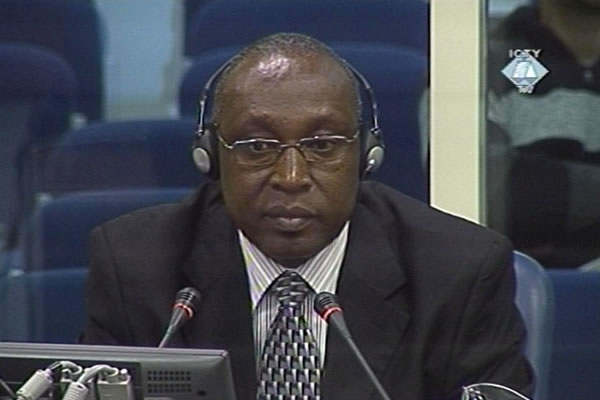Home
‘WE LOST THE ENCLAVE AND OUR HEADS’
Former UN military observer describes unsuccessfull attempts of the UNPROFOR to control the situation in the enclave and to help Bosniaks captured by Mladic’s troops after they entered the area nominally protected by the UN in July 1995
 Joseph Kingori, witness in the trial of the officials charged with the crimes in Srebrenica
Joseph Kingori, witness in the trial of the officials charged with the crimes in Srebrenica Kenyan colonel Joseph Kingori continued his testimony at the trial of the Bosnian Serb military and police officers charged with the crimes in Srebrenica and Zepa. He could do nothing to help the Bosniaks held captive in the ‘white house’ in Potocari, but he at least tried to write down as many of their names as he was able while watching how the army and police put them on buses on 13 July 1995.
‘I told them to shout their names out as loud as they could, although I wasn’t sure I would be able to write them down correctly’, Kingori said. The prisoners were put on the buses without their personal belongings and documents; they had to leave those in front of the ‘white house’. Kingori wanted to have ‘at least some written trace of who these men were’.
Earlier that day Kingori tried to establish what had happened to the Bosniak civilians taken by Serbian soldiers to an area ‘behind some buildings’ in Potocari. They never returned from there. The Dutch Battalion troops that told the military observers about this incident described that gunfire could be heard from the direction where the Bosniaks were taken. As Kingori himself approached the ‘white house’ in attempt to check the situation, he also heard shots but was stopped by some Serbian soldiers and couldn’t determine what was going on.
[IMAGE]3163[/IMAGE]In one of his reports to the UN commands in Sarajevo and Zagreb, Kingori noted that almost 30,000 people from Srebrenica had gathered in Potocari. Today, the former UN military observer confirmed this, adding that there were about 10,000 people in the Dutch Battalion base in Potocari and twice as many outside.
By the evening of 13 July 1995, there was nobody left except for the UNPROFOR troops, Kingori noted. His colleague Major De Haan wrote in his last report of the day, ‘We are very sorry we weren’t able to do more for the refugees who were asking for help that we couldn’t give them. We really lost the enclave, and our heads’. The UN military observers left the enclave together with the Dutch Battalion on 20 July 1995.
The Kenyan officer, one of the last prosecution witnesses, will continue his evidence in January 2008 after the winter recess. He will be cross-examined by the defense teams of the accused officers. The prosecution is expected to rest its case by 1 February 2008.
Linked Reports
- Case : Popovic et al. - "Srebrenica"
- 2007-12-13 OBSERVERS WERE HELPLESS
- 2007-12-06 WHAT SHOCKED BELGRADE JOURNALIST IN SREBRENICA
- 2007-12-05 ‘LOST TAKES’ FROM SREBRENICA FILM
- 2008-01-10 IMPARTIAL OBSERVERS?
- 2008-01-11 DID KENYA HAVE ‘SPECIAL INTEREST’ IN SREBRENICA?
- 2008-01-14 COMPARATIVE ANALYSIS YIELDS PROOF
